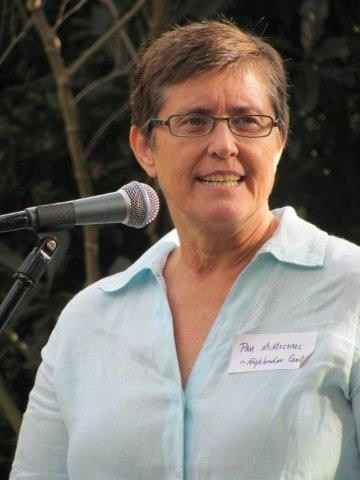This is one in a series of profiles marking the 60th anniversary of the ACLU of Kentucky’s founding. Each week through December 2015 we will highlight the story of one member, client, case, board or staff member that has been an integral part of our organization’s rich history.
Pam McMichael
“Put yourself in a position to understand history because then that history will be a source of lessons and inspirations because there were times that people thought Jim Crow would never be over, slavery would never be over.” -Pam McMichael
After seeing first-hand the disparities caused by structural racism, Pam McMichael joined a myriad of social justice groups, eventually leading her to the ACLU of Kentucky. McMichael is a co-founder of the statewide network of groups working for anti-discrimination protections (known as Fairness laws) for LGBT Kentuckians. She is also a longtime supporter and activist of ACLU-KY coalition partner The Fairness Campaign. Early in the fight for LGBT rights in the commonwealth, McMichael remembers being involved in a five-hour debate-style hearing, with one side speaking in support of fairness laws, and the other side against it. McMichael noted that the ACLU-KY played a key role in framing the issue as one of human rights, while also helping to break down negative stereotypes about LGBT people.
McMichael and activist Jeffrey Wasson were plaintiffs in one of the ACLU-KY’s groundbreaking civil rights cases. In Commonwealth of Kentucky v. Wasson the Kentucky Supreme Court struck down the state’s consensual sodomy statute as unconstitutional after years of litigation. The law criminalized private sexual relations by consenting adults if they happened to be of the same sex. The final Supreme Court decision in 1992 was a victory for the privacy and equal protection rights of LGBT Kentuckians.
McMichael points to the ACLU-KY’s sophisticated understanding of interlocking oppressions as a unique attribute and strength of the organization. She said, “I think it’s that unwavering commitment to civil liberties and the analysis about how attacks on civil liberties have a specific cut based on race, class, gender, and sexual orientation within our society sets the organization apart.” She went on to say, “My experience is much more local, but definitely the local ACLU and the leadership of the ACLU-KY that I worked with for many years have always done that really, really well.”
Now working with the Highlander Center—the social justice leadership training school that provided space for activists such as Anne Braden and Martin Luther King Jr.—McMichael still devotes herself to the service of the greater good. One of the big things McMichael stressed about fighting for rights is that it’s never about “sitting back down and saying, ‘Oh, it can never change, it can never be this way,’” but rather imagining the possibilities and “holding up that vision of what could be.”
